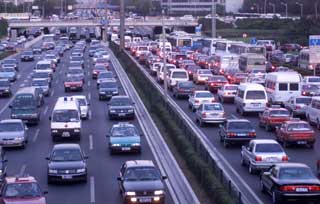Beijing is drafting contingency plans to alleviate the city's smothering
traffic and smog during the 2008 Olympics.

Traffic congestion on Beijing's third ring
road is shown in this October 22, 2003 file photo. Beijing is planning
traffic contingencies during the coming 2008 Olympic Games.
[newsphoto] |
Jiang Xiaoyu, a vice-president
of the Beijing Olympic organizing committee, said Thursday that partial traffic
bans and special lanes for Olympic traffic on some roadways are already being
planned. He said other measures are under consideration.
Jiang did not elaborate, but committee officials have privately said possible
contingencies include an extended holiday for the Chinese capital's huge
government work force and limiting city residents to driving their cars every
other day.
"We're striving to achieve better air quality by the 2008 Games to welcome
the athletes and the Olympic family," Jiang told a news conference at the end of
a three-day inspection visit by the International Olympic Committee.
In contrast to the smooth construction of Olympic venues, traffic and
pollution have emerged as key problems for Beijing as it prepares for the Games
two years from now. With soaring car ownership and other trickle-down effects of
economic growth, the city is regularly choked in brown haze and jammed traffic,
lengthening commutes and frustrating citizens and officials.
The IOC inspectors' visit occurred as a sandstorm raked the city in yellow
grit, fouling the air. For much of Tuesday and Wednesday, the Beijing
Environmental Protection Bureau recorded severely polluted air in the capital.
City and Beijing Olympic officials insist the situation is improving. Jiang
said nearly two out of three days last year had air quality ranked as good or
better. He ticked off a list of measures being taken to improve traffic, from
adding more highways to lengthening the subway system.
In reviewing Beijing's progress toward the Olympics, the IOC delegation
expressed confidence in the city, said it was meeting its targets and praised
the construction of the sports venues, especially a futuristic swimming centre
and a national stadium, known as the Bird's Nest because of its lattice steel
exterior.
"You can't think of any other word than 'stunning,'" said Hein Verbruggen,
the head of the IOC's coordination committee.
Verbruggen also acknowledged the challenge that traffic and pollution pose
for the city. Beijingers purchased about 1,000 new cars a day last year, giving
the city 2.6 million vehicles, half of them private.
"Staggering figures like that give an idea of the problems they have to
solve," Verbruggen said at the news conference. Afterward he said, "It's an
uphill battle for them."
Beijing dropped from fourth to 15th place in a Chinese survey of livable
cities this year, in part because of pollution and traffic. The city has 7,000
building sites, many of them being rushed to completion ahead of the Olympics. A
relay marathon went ahead last month despite hazardous smog.
Beijing's mayor regularly cites air pollution, traffic and water shortages as
among his gravest problems.
"You're lucky the air quality is good during your visit," Mayor Wang Qishan
told visiting Chicago Mayor Richard M. Daley on Monday. When Daley handed Wang a
photograph of the Chicago skyline with Lake Michigan in the foreground, Wang
said, wistfully: "Look, the sky is blue, the water clean."
The IOC and Beijing organizers have said they are counting on the traditional
hospitality of ordinary Chinese and their enthusiasm for the Olympics to make
the Games a success. But the Olympic contingency plans are testing the tolerance
of ordinary Chinese, who have grown more free and assertive after two decades of
economic reforms.
Privately, Beijing Olympic organizers have said that city residents, if given
vacations during the Games, might swarm the venues, rather than leave the city
on holiday. Excessive security that keeps Chinese away could also spark negative
media reports and spoil the atmosphere.
"The temporary administrative measures we will take will be in line with
international practices," said Jiang.